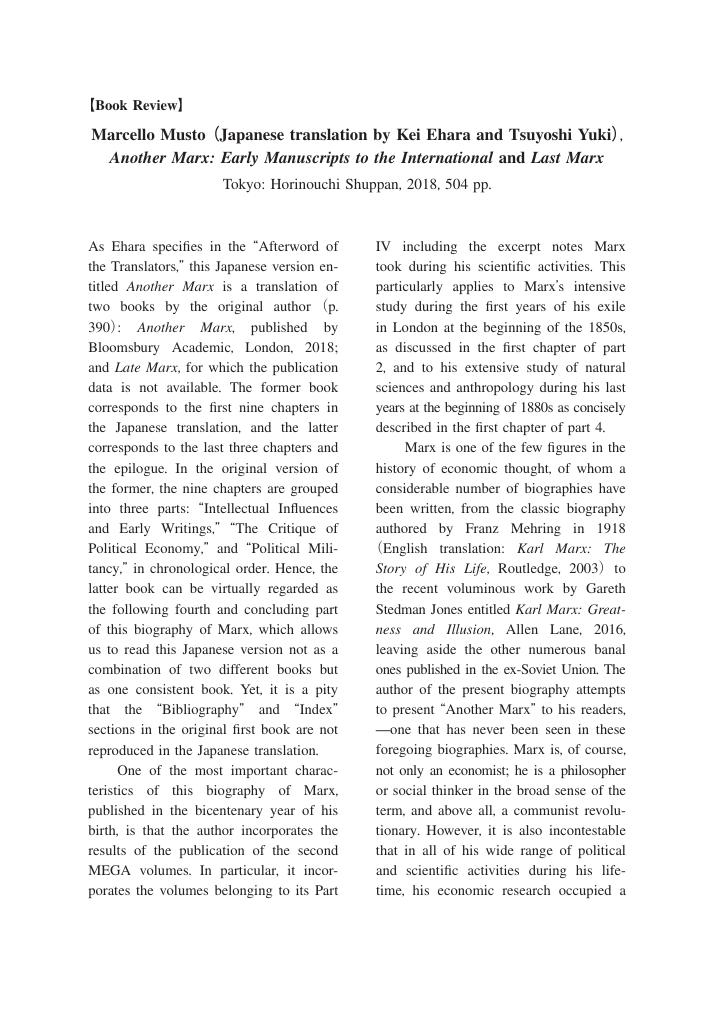- 著者
- 竹永 進
- 出版者
- 大東文化大学
- 雑誌
- 経済論集 (ISSN:02874237)
- 巻号頁・発行日
- vol.89, pp.91-113, 2007-07
- 著者
- 竹永 進
- 出版者
- 大東文化大学
- 雑誌
- 経済論集 (ISSN:02874237)
- 巻号頁・発行日
- vol.91, pp.25-45, 2008-07
- 著者
- 竹永 進
- 出版者
- 大東文化大学
- 雑誌
- 経済論集 (ISSN:02874237)
- 巻号頁・発行日
- vol.90, pp.21-42, 2008-03
5 0 0 0 貨幣的循環理論の構造と問題 (三)
- 著者
- 竹永 進
- 出版者
- 大東文化大学
- 雑誌
- 経済論集 (ISSN:02874237)
- 巻号頁・発行日
- vol.82, pp.41-66, 2004-02-25
5 0 0 0 貨幣的循環理論の構造と問題 (四)
- 著者
- 竹永 進
- 出版者
- 大東文化大学
- 雑誌
- 経済論集 (ISSN:02874237)
- 巻号頁・発行日
- vol.83, pp.33-58, 2004-07-25
5 0 0 0 IR 貨幣的循環理論の構造と問題 (一)
- 著者
- 竹永 進
- 出版者
- 大東文化大学
- 雑誌
- 経済論集 (ISSN:02874237)
- 巻号頁・発行日
- vol.80, pp.75-94, 2002-12-20
5 0 0 0 IR 貨幣的循環理論の構造と問題 (二)
- 著者
- 竹永 進
- 出版者
- 大東文化大学
- 雑誌
- 経済論集 (ISSN:02874237)
- 巻号頁・発行日
- vol.81, pp.15-39, 2003-04-30
- 著者
- ヴァーシナ リュドミーラ 竹永 進
- 出版者
- 東京経済大学経済学会
- 雑誌
- 東京経大学会誌. 経済学 (ISSN:13486403)
- 巻号頁・発行日
- no.277, pp.269-299, 2013
- 著者
- 竹永 進
- 出版者
- The Japanease Society for the History of Economic Thought
- 雑誌
- 経済学史研究 (ISSN:18803164)
- 巻号頁・発行日
- vol.61, no.2, pp.84-85, 2020 (Released:2020-02-29)
- 著者
- 竹永 進
- 出版者
- 経済学史学会
- 雑誌
- 経済学史研究 (ISSN:18803164)
- 巻号頁・発行日
- vol.61, no.2, pp.92-93, 2020 (Released:2020-02-29)
- 被引用文献数
- 1
- 著者
- 竹永 進
- 出版者
- 経済学史学会
- 雑誌
- 経済学史研究 (ISSN:18803164)
- 巻号頁・発行日
- vol.58, no.2, pp.28-30, 2017 (Released:2019-11-30)
- 著者
- 竹永 進
- 出版者
- 経済学史学会
- 雑誌
- 経済学史研究 (ISSN:18803164)
- 巻号頁・発行日
- vol.51, no.2, pp.112-113, 2009 (Released:2019-08-08)
- 著者
- 竹永 進
- 出版者
- 経済学史学会
- 雑誌
- 経済学史研究 (ISSN:18803164)
- 巻号頁・発行日
- vol.49, no.1, pp.164-165, 2007-06-30 (Released:2010-08-05)
- 著者
- 竹永 進
- 出版者
- The Japanese Society for the History of Economic Thought
- 雑誌
- 経済学史学会年報 (ISSN:04534786)
- 巻号頁・発行日
- vol.42, no.42, pp.143-146, 2002 (Released:2010-08-05)
- 著者
- 竹永 進
- 出版者
- The Japanese Society for the History of Economic Thought
- 雑誌
- 経済学史学会年報 (ISSN:04534786)
- 巻号頁・発行日
- vol.37, no.37, pp.191-192, 1999 (Released:2010-08-05)
- 著者
- 竹永 進
- 出版者
- The Japanese Society for the History of Economic Thought
- 雑誌
- 経済学史学会年報 (ISSN:04534786)
- 巻号頁・発行日
- vol.33, no.33, pp.172, 1995 (Released:2010-08-05)
- 著者
- 竹永 進
- 出版者
- 経済学史学会
- 雑誌
- 経済学史学会年報 (ISSN:04534786)
- 巻号頁・発行日
- vol.27, no.27, pp.68-69, 1989 (Released:2010-08-05)
1 0 0 0 OA Henri Denis, L'«Economie» de Marx, Histoire d'un échec Presses Universitaires de France, 1980
- 著者
- 竹永 進
- 出版者
- The Japanese Society for the History of Economic Thought
- 雑誌
- 経済学史学会年報 (ISSN:04534786)
- 巻号頁・発行日
- vol.21, no.21, pp.61, 1983 (Released:2010-08-05)
1 0 0 0 OA 報告1 ジャン=バティスト・セーの蔵書への注記 「山口文庫」セー旧蔵書の書き込み
- 著者
- ジャン=ピエール・ポティエ Jean-Pierre Potier 竹永 進 Takenaga Susumu 出雲 雅志 Izumo Masashi
- 出版者
- 神奈川大学
- 雑誌
- 神奈川大学史紀要 (ISSN:24240567)
- 巻号頁・発行日
- vol.03, pp.92(39)-73(58), 2018-03-31
神奈川大学図書館セミナー
1 0 0 0 知られざるマルクス : メガが今日までにマルクスの著作についてわれわれに語ったこと、メガ以前にわれわれが知らなかったこと(<特集>『資本論』草稿研究の現在-新メガの編集・刊行とその成果)
- 著者
- クレトケ ミヒャエル・R 竹永 進
- 出版者
- 経済理論学会
- 雑誌
- 経済理論 (ISSN:18825184)
- 巻号頁・発行日
- vol.42, no.4, pp.34-44, 2006
The second MEGA, starting in the 1970s, has provided access to quite a lot of hitherto unknown and unpublished writings by Marx and Engels. It has allowed us to discover an unknown Marx, in particular with respect to his unfinished masterpiece, Capital. Because of the many manuscripts pertaining to this great project that have been published in recent years, we are now able to assess the long road that led towards what we know as Capital in much detail. As a matter of fact, Marx did actually write no less than four different versions of his critique of political economy, starting in 1857/58. When he died in 1883, he was not yet finished with it. We are also able to follow Marx' revising and rewriting of Capital, volume I from the first German edition of 1867 until the 3^<rd> German edition of 1883, which had still been largely prepared by Marx himself, Capital remained largely a work in progress. Thanks to the materials that already have been published or will be published in the years to come, we are now able to get a clear idea of Marx' work on Capital during the last 15 years of his life, when, as conventional wisdom has it, he seemed to have lost track of his great project. On the contrary, the evidence shows that he continued to work on it until his last days. Recently, Engels' work as editor of Marx' manuscripts for Capital, volume II and III, has been criticized harshly, once the original manuscripts for volume II and III of Capital had been published. As more of Engels' redaction manuscripts have been or are about to be published in the MEGA, we are now able to reassess Engels' work-and to refute most of the criticism as rather exaggerated.









